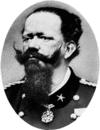- Victor Emmanuel II
-
1820-78, king of Sardinia 1849-78; first king of Italy 1861-78.
* * *
Italian Vittorio Emanueledied Jan. 9, 1878, Rome, ItalyKing of Sardinia (1849–61) and first king of a united Italy (1861–78).The son of Charles Albert, he took part in the war against Austria (1848) and became king when his father abdicated in 1849. Assisted by his minister Camillo Cavour, he strengthened the kingdom and supported the Risorgimento movement for unity. In the war with Austria (1859–61), he commanded troops to victories in the Battles of Magenta and Solferino. He secretly encouraged Giuseppe de Garibaldi in the conquest of Sicily and Naples and led the invasion of the Papal States. He assumed the title of king of Italy (1861) and later acquired Venetia (1866) and Rome (1870). Victor Emmanuel IIAlinari-Art Resource/EB Inc.
Victor Emmanuel IIAlinari-Art Resource/EB Inc.* * *
▪ king of Italyborn March 14, 1820, Turin, Piedmont, Kingdom of Sardiniadied Jan. 9, 1878, Romeking of Sardinia–Piedmont who became the first king of a united Italy.Brought up in the court of his father, Charles Albert, and given a conventional monarchical education emphasizing religious and military training, he was married to his cousin Maria Adelaide, daughter of an Austrian archduke. After the Revolution of 1848, when war broke out with Austria, Victor Emmanuel was given command of a division. In the luckless campaign that followed he proved a brave soldier but an indifferent general.Ascending the throne on his father's abdication, he consolidated his position by suppressing the republican left and paying an indemnity to Austria, which brought him considerable opprobrium in Italy. In November 1852 he made the momentous decision to turn the government over to the able, determined Count Cavour (Cavour, Camillo Benso, conte di (count of)), whose skillful manoeuvres over the next few years made him king of Italy. At the decisive battles of Magenta and Solferino, he commanded the Piedmontese corps in person, and following the armistice of Villafranca, he exercised a valuable restraint on Cavour, who wanted to continue the war alone. The following year Victor Emmanuel secretly encouraged Garibaldi in the conquest of Sicily and Naples; he then led his Piedmontese army into papal territory to link up with Garibaldi in the face of an excommunication by Pius IX.Following Cavour's death in 1861, Victor Emmanuel played a more direct role in government and despite setbacks achieved two notable triumphs: the acquisition of Venetia through war on the side of Bismarck's Prussia in 1866, and of Rome after the withdrawal of the French garrison in 1870. The occupation of Rome as the national capital so antagonized Pius IX that he refused all overtures toward reconciliation, and no meeting ever took place between the two sovereigns; nevertheless, on Victor Emmanuel's death in 1878 Pius permitted his burial in the Pantheon.* * *
Universalium. 2010.
